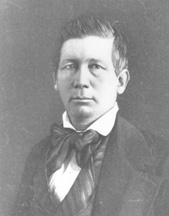Edward Hannegan
| Edward A. Hannegan | |
|---|---|
 |
|
| Indiana House of Representatives | |
|
In office 1832–1833 |
|
|
In office 1841–1842 |
|
| Member of the U. S. House of Representatives from Indiana's 7th district | |
|
In office March 4, 1833 – March 3, 1837 |
|
| Preceded by | District created |
| Succeeded by | Albert S. White |
|
United States Senator from Indiana |
|
|
In office March 4, 1843 – March 3, 1849 |
|
| Preceded by | Oliver H. Smith |
| Succeeded by | James Whitcomb |
| Personal details | |
| Born |
June 25, 1807 Hamilton County, Ohio |
| Died | February 25, 1859 (aged 51) St. Louis, Missouri |
| Political party |
Democratic-Republican Democrat |
| Spouse(s) | Mary Chambers Duncan |
| Profession | Lawyer Schoolteacher |
Edward Allen Hannegan (June 25, 1807 – February 25, 1859) was a United States Representative and Senator from Indiana.
Born in Hamilton County, Ohio, he moved with his parents to Bourbon County, Kentucky the same year. He attended the public schools, studied law at Transylvania University, taught school, and worked as a farm hand. Hannegan moved to Fountain County, Indiana about 1825 where he worked as a farm hand and as a school teacher. He was admitted to the bar in April 1828 in Fountain County. Moving the following year, he was admitted to practice law in Warren County, Indiana on May 27, 1829, settling in Williamsport. A few months later, he moved to Covington, where he continued the practice of law. At some unknown time, Hannegan became a Freemason. On April 4, 1829, he married Margaret Chambers Duncan in Knox County, Indiana; they had one son, Sellman Key Hannegan, born January 20, 1832.
Hannegan was a member of the Indiana House of Representatives 1832–1833 and 1841–1842. He was elected as a Democrat to the Twenty-third and Twenty-fourth Congresses, serving from March 4, 1833 – March 4, 1837. Hannegan was not a candidate for renomination in 1836 and resumed the practice of law; he was elected as a Democrat to the U.S. Senate in 1842 and served from March 4, 1843 to March 4, 1849. He was an unsuccessful candidate for renomination in 1849, losing to Governor James Whitcomb.
While in the Senate, he was chairman of the Committee on Private Land Claims (Twenty-ninth Congress) and a member of the Committee on Roads and Canals (Twenty-ninth and Thirtieth Congresses) and the Committee on Foreign Relations (Thirtieth Congress).
...
Wikipedia
